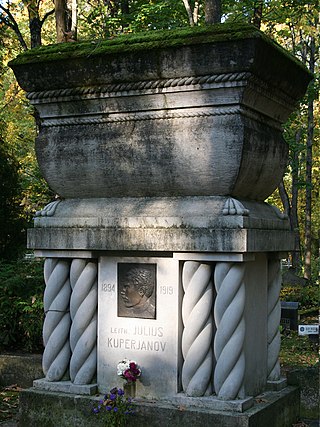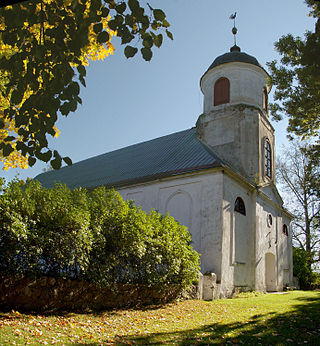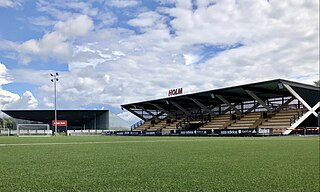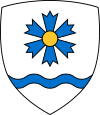
Tartu is the second largest city in Estonia after Tallinn. Tartu has a population of 97,435. It is 186 kilometres southeast of Tallinn and 245 kilometres northeast of Riga, Latvia. Tartu lies on the Emajõgi river, which connects the two largest lakes in Estonia, Lake Võrtsjärv and Lake Peipus. From the 13th century until the end of the 19th century, Tartu was known in most of the world by variants of its historical name Dorpat.

Tartu Airport is an airport in Reola, Ülenurme Parish, 5.9 nautical miles south southwest of Tartu, the second largest city in Estonia. It is also called Ülenurme Airport due to its proximity to the village of Ülenurme. The Tallinn–Tartu–Võru–Luhamaa highway (E263) passes near the airport.

Julius Kuperjanov VR I/2, VR II/2 and VR II/3 was an Estonian military officer who was well-known in Estonia for being one of the Liberators of Tartu during the War of Independence and commander of the Tartumaa Partisan Battalion.

Raadi Airfield(ICAO: EETR) is a former air base in Estonia located in Raadi, 4 km (2.5 mi) northeast of Tartu. The land once belonged to Raadi Manor and is now the new site of the Estonian National Museum.

Hugo Hermann Fürchtegott Treffner was the founder and first director of the Hugo Treffner Gymnasium in Tartu, and an important figure in the Estonian national awakening.

Raadi cemetery, is the oldest and largest burial ground in Tartu, Estonia, dating back to 1773. Many prominent historical figures are buried there. It is also the largest Baltic German cemetery in Estonia after the destruction of Kopli cemetery in Tallinn. Until 1841, it was the only cemetery in the town.

Tartu Parish is a rural municipality in Tartu County, Estonia. It has a population of 12,725 and covers an area of 742 km2 (286 sq mi). The population density is 17.150/km2 (44.42/sq mi). It has one borough (Raadi), six small boroughs and 70 villages.

The Estonian National Museum founded 1909 in Tartu is a museum devoted to folklorist Jakob Hurt's heritage, to Estonian ethnography and folk art. The first items for the museum were originally collected in the latter part of the 19th century.

Kodavere is a village in Peipsiääre Parish, Tartu County, Estonia. It lies on the shore of Lake Peipus.

Raadi-Kruusamäe, or Raadi for short, is a neighbourhood of Tartu, Estonia. It has a population of 4,498 and an area of 2.83 km2 (1.09 sq mi). Raadi is mainly suburban area.

Raadi Manor was in the area known as Raadi-Kruusamäe, on the outskirts of Tartu in Estonia. The manor and Raadi Manor Park were the home to the Liphart noble family who were significant art collectors. The family moved away and the buildings housed the Estonian National Museum until the manor was destroyed during the Second World War. Part of the grounds became Raadi Airfield which was used as a secret Soviet bomber base for fifty years. Today the park is open, some buildings are in use by the museum and plans are underway to create a new museum building here.

Ilmari Justus Andreus Manninen was a Finnish professor, writer and ethnographer. He led the Estonian National Museum when it opened at Raadi Manor.
Raadi is a village in Estonia, in Võru Parish, which belongs to Võru County.
Vahi is a small borough in Tartu Parish, Tartu County in eastern Estonia. It has a population of 1,620.
Vahi was a village in Tabivere Parish, Jõgeva County (1991–2017) and in Tartu Parish, Tartu County (2017–2022) in Estonia. The village of Vahi was dissolved on 4 July 2022 and its territories were merged with the villages of Otslava and Lilu.
Otslava is a village in Tartu Parish, Tartu County in Estonia.
Tedreküla is a village in Peipsiääre Parish, Tartu County in Estonia.

Raadi Nature Reserve is a nature reserve which is located in Tartu County, Estonia.
Raadi is a borough in Tartu Parish, Tartu County.

Holm Jalgpallipark is a football stadium in Tartu, Estonia. Located next to the Estonian National Museum and in the Raadi district, it is the home ground of Tartu JK Welco.















